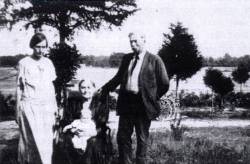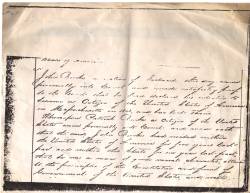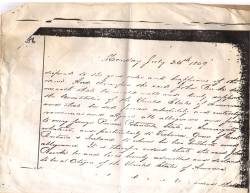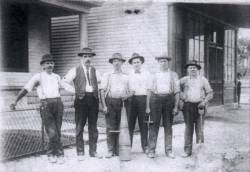

 John Burke
John Burke 
General Notes
If you are a Burke, Burk, Burgh, Burgho or De Burgh or De Burgho we are all from the same root system of the old family tree. There is only one country of origin, and it isn't Ireland! There are three later countries of settlement from which many of our families came to the US or went to Australia... and like most Irish families, most of the immigrating part of the Burke lineage came from Ireland. That however is due to the famine. The original De Burgh or De Burgho part of the family comes from Northern France, NOT "Burghundy" although that would be cool. De Burgh actually means from the city (town). It was a Norman name. Normans were the product of the Vikings having bitten off all of Northern France. They spoke a Norse/French tongue. But way back when our family was Viking.
When William the Conquerer launched his attack on England, the family name was just starting to be used (as De Burgh) and later the klan moved to Ireland in about 1070, as part of the Norman invasion.
Interesting how the name changed: De Burgh which was a classic Norman name became Burke about the time that the Eldest male De Burgh died without leaving an Heir. By Norman law the land then goes to his daughter and the King or Queen, would have the right to marry her to some other noble to insure protection of the land. Effectively giving control of the land to another family in favor. By that time, we were NOT in favor with the new King. But under Brehon Law (Celtic/Irish) the land would go to the next male in the De Burgh line. Miraculously, the De Burgh cousins and nephews adopted the Celtic laws and became "More Irish than the Irish themselves" fighting the "New English" land lords for the land that they had all grown up on...
One splinter group was a Klan that separated from the family before the main branch moved South. While the Red Earl of Ulster was still head of the De Burgh clan, but after some of the De Burghs had become Burkes. That Clan went to Scottland with the MacDonald clan who at the time were making an attempt on the throne of Scottland. The Lord of the Isles (MacDonald Clan) married a lady Burke, and her semi-imediate family moved from Ulster to the surrounding Isles, then and now part of Scotland.
That splinter group dropped the E in many documents, although I don't know if they were to only ones to do so.
But thanks to that marrage, we are now able to wear the Ancient Scottish Tartan for the MacDonald clan sometimes called the "Great Lord of the Isles" or the Hunting MacDonald. Luckily that particular one is mostly green so we don't loose too much or our ancient Irish heritage by wearing a Scottish Kilt!
---
The following is taken from "The Burke Family" by Leah B. Campbell
"As a child, John Burke lived in the Portland area of Louisville and served as an altar boy at St. Patrick Catholic Church.
It is said that John Burke ran away from home at the age of 12 and was taken in at St. Joseph's Boarding School in the Bardstown area, where he stayed until about the age of 18. The story is told that when he came home to Louisville, he boarded a streetcar to go to Portland and thought he recognized one of the two women who got on the streetcar with him. When he and the woman both got off the streetcar in Portland, he realized it was his mother.
John Burke was in Louisville at the time of his marriage in 1883. In 1885, John was in Bullitt County, Kentucky, as indicated in reports of a court trial. An issue of the 'Pioneer News' in Shepherdsville gave an account of that trial in November 1885.
The Story is told that a Frank Bridwell, who was in a wheelchair, came to John Burke's house with a shotgun. Bridwell intended to kill John Burke because of a dispute over some animals. John Burke was forewarned, and ended up shooting and killing Frank Bridwell. Information from the 'Pioneer News' states that the trial was held on 17 November 1885. Warrants were issued for witnesses Turner Bivens and William Bridwell for not appearing. Bail was set at $2,000. The attorney for John Burke was F.P. Strauss, Esquire, appointed by the court. Jury members were: Robert Greenwell, J.W. Alexander, Orleans Lee, Nathan Hall, G. Likey, James Joyce, W.T. Hill, M.L. Shawler, John Gabin, Gile Griffin, Howard Hiss, W.H. Riley.
John Burke was found guilty, but punishment was set at only two years because of self-defense. Sentence was to be served in the penitentiary. John Burke awaited the judgement of the court in the Bullitt County jail. He served the time in the Bullitt County jail, however, and was never moved to the penitentiary. There were no records found to confirm when he was released or exactly how much time he actually served.
John Burke returned to Louisville sometime later, though the exact year is unknown. A child born in 1889 was born in Louisville. When his children were young, John and Fanny Ella lived between 17th and 18th on High Street (Northwestern Parkway) in Portland. John Burke was a brick layer and stone mason, and helped lay the first brick sidewalks along 19th and Bank Streets. After living on High Street, the family moved to Duncan Street and lived next door to John's sister, Clara Burke Mayfield. John Burke and his family moved back to Bullitt County in 1916.
John Burke left the Catholic church and became a Baptist. He was in the Berachah (a Hebrew word meaning 'blessing') Sunday School Class and served as a deacon at Bullitt Lick Baptist Church in Shepherdsville. It seems the name of his Sunday School class was appropriate. Despite troubles in his early life, he was remembered later by a grandchild as a Christian; a good man who was well respected in the community.
John Burke died 04 August 1929. Fanny Ella died 15 January 1939. They are both buried in Hebron Cemetery, Shepherdsville, Kentucky."
 Details of John's family with Fanny Ella Ferguson
Details of John's family with Fanny Ella Ferguson
Page last modified











